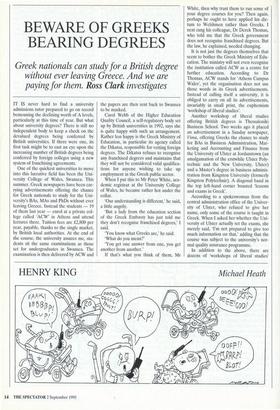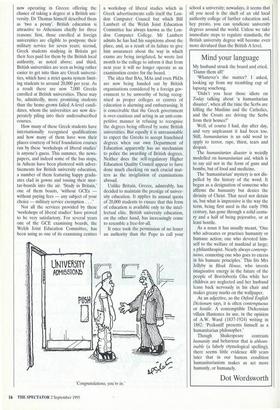BEWARE OF GREEKS BEARING DEGREES
Greek nationals can study for a British degree without ever leaving Greece. And we are
paying for them. Ross Clark investigates IT IS never hard to find a university admissions tutor prepared to go on record bemoaning the declining worth of A levels, particularly at this time of year. But what about university degrees? There is still no independent body to keep a check on the devalued degrees being conferred by British universities. If there were one, its first task might be to cast an eye upon the increasing number of British degrees being conferred by foreign colleges using a new system of franchising agreements.
One of the quickest universities to move into this lucrative field has been the Uni- versity College of Wales, Swansea. This summer, Greek newspapers have been car- rying advertisements offering the chance for Greek nationals to study for the Uni- versity's BAs, MAs and PhDs without ever leaving Greece. Instead the students — 19 of them last year — enrol at a private col- lege called `ACW' in Athens and attend lectures there. Tuition fees are £2,800 per year, payable, thanks to the single market, by British local authorities. At the end of the course, the university assures me, stu- dents sit the same examinations as those set for undergraduates in Swansea. The examination is then delivered by ACW and the papers are then sent back to Swansea to be marked.
Carol Webb of the Higher Education Quality Council, a self-regulatory body set up by British universities in 1992, says she is quite happy with such an arrangement. Rather less happy is the Greek Ministry of Education, in particular its agency called the Dikatsa, responsible for vetting foreign degrees. The Dikatsa refuses to recognise any franchised degrees and maintains that they will not be considered valid qualifica- tions for anyone wishing to take up employment in the Greek public sector.
When I put this to Mr Peter White, aca- demic registrar at the University College of Wales, he became rather hot under the collar.
'Our understanding is different,' he said, a little angrily.
'But a lady from the education section of the Greek Embassy has just told me they don't recognise franchised degrees,' I said.
'You know what Greeks are,' he said. 'What do you mean?'
'You get one answer from one, you get another from another.'
If that's what you think of them, Mr White, then why trust them to run some of your degree courses for you? Then again, perhaps he ought to have applied his dic- tum to Welshmen rather than Greeks. I next rang his colleague, Dr Derek Thomas, who told me that the Greek government does not recognise franchised degrees. But the law, he explained, needed changing.
It is not just the degrees themselves that seem to bother the Greek Ministry of Edu- cation. The ministry will not even recognise the institution called ACW as a centre for further education. According to Dr Thomas, ACW stands for 'Athens Campus Wales', yet the organisation does not use those words in its Greek advertisements. Instead of calling itself a university, it is obliged to carry on all its advertisements, invariably in small print, the euphemism 'workshop of liberal studies'.
Another workshop of liberal studies offering British degrees is Thessaloniki Business School. Two weeks ago it placed an advertisement in a Sunday newspaper, Vima, offering Greeks the chance to study for BAs in Business Administration, Mar- keting and Accounting and Finance from the University of Ulster at Jordanstown (an amalgamation of the erstwhile Ulster Poly- technic and the New University, Ulster) and a Master's degree in business adminis- tration from Kingston University (formerly Kingston Polytechnic). A diagonal band in the top left-hand corner boasted 'lessons and exams in Greek'.
According to a spokeswoman from the central administration office of the Univer- sity of Ulster, who refused to give her name, only some of the course is taught in Greek. When I asked her whether the Uni- versity of Ulster actually set the exams, she merely said, 'I'm not prepared to give too much information on that,' adding that the course was subject to the university's nor- mal quality assurance programme.
In addition to the above, there are dozens of 'workshops of liberal studies' now operating in Greece offering the chance of taking a degree at a British uni- versity. Dr Thomas himself described them as 'two a penny'. British education is attractive to Athenians chiefly for three reasons: first, those enrolled at foreign universities are eligible to postpone their military service for seven years; second, Greek students studying in Britain get their fees paid for them by the British local authority, as noted above; and third, British universities are seen as being rather easier to get into than are Greek universi- ties, which have a strict quota system limit- ing students to around 20,000 per year. As a result there are now 7,000 Greeks enrolled at British universities. These may be, admittedly, more promising students than the home-grown failed A-level candi- dates, whom the universities are now des- perately piling into their undersubscribed courses.
How many of these Greek students have internationally recognised qualifications and how many of them have won their places courtesy of brief foundation courses run by these 'workshops of liberal studies' is anyone's guess. This summer, the news- papers, and indeed some of the bus stops, in Athens have been plastered with adver- tisements for British university education, a number of them featuring happy gradu- ates clad in gowns and tossing their mor- tar-boards into the air. 'Study in Britain,' one of them boasts, 'without GCEs — without paying fees — any subject of your choice — military service exemption.
Not all the services provided by these 'workshops of liberal studies' have proved to be very satisfactory. For several years one of the GCE examining boards, the Welsh Joint Education Committee, has been using as one of its examining centres a workshop of liberal studies which in Greek advertisements calls itself the Lon- don Computer Council but which Bill Lambert of the Welsh Joint Education Committee has always known as the Lon- don Computer College. Mr Lambert admits he has had his suspicions about the place, and, as a result of its failure to give him assurances about the way in which exams are being invigilated, he wrote last month to the college to inform it that from next year it will no longer operate as an examination centre for the board.
The idea that BAs, MAs and even PhDs are now being handed out by British organisations considered by a foreign gov- ernment to be unworthy of being recog- nised as proper colleges or centres of education is alarming and embarrassing. It is conceivable that the Greek government is over-cautious and acting in an anti-com- petitive manner in refusing to recognise the degrees being offered by some British universities. But equally it is unreasonable to expect the Greeks to accept franchised degrees when our own Department of Education apparently has no mechanism to police the awarding of British degrees. Neither does the self-regulatory Higher Education Quality Council appear to have done much checking on such crucial mat- ters as the invigilation of examinations abroad.
Unlike Britain, Greece, admirably, has decided to maintain the prestige of univer- sity education. It applies its annual quota of 20,000 students to ensure that this form of education is available only to the intel- lectual elite. British university education, on the other hand, has increasingly come to resemble a free-for-all.
It once took the permission of no lesser an authority than the Pope to call your 'Congratulations, you're in.' school a university; nowadays, it seems that all you need is the shell of an old local authority college of further education and, hey presto, you can syndicate university degrees around the world. Unless we take immediate steps to regulate standards, the British university degree will become even- more devalued than the British A level.



















































 Previous page
Previous page